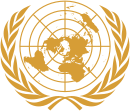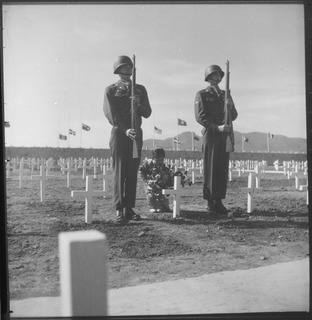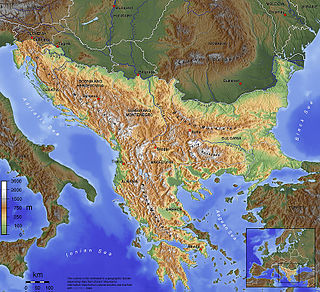| Part of a series on the |
| UN Security Council resolutions |
|---|
| Permanent members |
| Resolutions 1 to 1000 |
| Resolutions 1001 to 2000 |
| Resolutions 2001 to 3000 |
| Resolutions by topic |
| Vetoed resolutions |
| List of vetoes · Power of veto |
| UN Security Council UNBISnet · Wikisource |
This is a list of United Nations Security Council Resolutions 1 to 100 adopted between 25 January 1946 and 27 October 1953.
| Resolution | Date | Vote | Concerns |
|---|---|---|---|
| 1 | 25 January 1946 | Adopted without vote | Establishing the Military Staff Committee |
| 2 | 30 January 1946 | 11–0–0 | The Iran crisis of 1946 |
| 3 | 4 April 1946 | 9–0–0 (present not voting: Australia; absent: USSR) | Soviet troops in Iran |
| 4 | 29 April 1946 | 10–0–1 (abstention: USSR) | Condemning Francoist Spain |
| 5 | 8 May 1946 | 10–0–0 (absent: USSR) | Soviet troops in Iran |
| 6 | 17 May 1946 | 11–0–0 | Procedural matters regarding admissions |
| 7 | 26 June 1946 | Resolution was adopted in parts, no vote taken on text as a whole | Condemning Francoist Spain, continued monitoring of the situation |
| 8 | 29 August 1946 | 10–0–1 (abstention: Australia) | Admission of Afghanistan, Iceland and Sweden |
| 9 | 15 October 1946 | 11–0–0 | Jurisdiction of the International Court of Justice |
| 10 | 4 November 1946 | 11–0–0 | Determining Spain no longer warranted observation by the Council |
| 11 | 15 November 1946 | Adopted without vote | Switzerland and the International Court of Justice |
| 12 | 10 December 1946 | 11–0–0 (paragraphs 1 & 2); "majority vote" (paragraph 3) | British troops in Greece |
| 13 | 12 December 1946 | 11–0–0 | Admission of Siam (Thailand) |
| 14 | 16 December 1946 | 9–0–2 (abstentions: USSR, USA) | Terms of Presidency of the Security Council |
| 15 | 19 December 1946 | 11–0–0 | Greek–Albanian and Bulgarian–Yugoslavian border violations |
| 16 | 10 January 1947 | 10–0–1 (abstention: Australia) | Recognising the establishment of the Free Territory of Trieste |
| 17 | 10 February 1947 | 9–0–2 (abstentions: Poland, USSR) | Executions of political prisoners in Greece, Albania, Bulgaria and Yugoslavia |
| 18 | 13 February 1947 | 10–0–1 (abstention: USSR) | Creation of a commission relating to armament regulation and reduction |
| 19 | 27 February 1947 | 8–0–3 (abstentions: Poland, Syria, USSR) | Straits of Corfu incidents |
| 20 | 10 March 1947 | 11–0–0 | Review of report by the Atomic Energy Commission |
| 21 | 2 April 1947 | 11–0–0 | Trusteeship of strategic areas: German Pacific Islands |
| 22 | 9 April 1947 | 8–0–2 (abstentions: Poland, USSR; present not voting: United Kingdom) | Corfu Channel incidents |
| 23 | 18 April 1947 | 9–0–2 (abstentions: Poland, USSR) | Extending and enlarging commission relating to the "Greek Question" |
| 24 | 30 April 1947 | 10–0–1 (abstention: Australia) | Admission of Hungary |
| 25 | 23 May 1947 | 10–0–1 (abstention: Australia) | Admission of Italy |
| 26 | 4 June 1947 | 11–0–0 | Procedure relating to the International Court of Justice |
| 27 | 1 August 1947 | To invite Indonesia: 8–0–3 (abstentions: France, Belgium, United Kingdom) To invite the Philippines: 9–0–2 (abstentions: Poland, USSR) | The Indonesian National Revolution |
| 28 | 6 August 1947 | 10–0–1 (abstention: USSR) | Sub-committee relating to the "Greek Question" |
| 29 | 12 August 1947 | Admission of Yemen, Pakistan adopted 11–0–0 | Admission of Yemen, Pakistan |
| 30 | 25 August 1947 | 7–0–4 (abstentions: Colombia, Poland, USSR, United Kingdom) | Indonesian National Revolution |
| 31 | 25 August 1947 | 8–0–3 (abstentions: Poland, Syria, USSR) | Committee relating to resolution of the Indonesian National Revolution |
| 32 | 26 August 1947 | 10–0–1 (abstention: United Kingdom) | Condemning continued violence in Indonesia |
| 33 | 27 August 1947 | 10–0–1 (abstention: Australia) | Reviewing General Assembly views on rules of procedure of the Council |
| 34 | 15 September 1947 | 9–2–0 (against: Poland, USSR) | Removing disputes between Greece & Albania and Yugoslavia & Bulgaria |
| 35 | 3 October 1947 | 9–0–2 (abstentions: Poland, USSR) | Work schedule of committee relating to the revolution in Indonesia |
| 36 | 1 November 1947 | 7–1–3 (against: Poland; abstentions: Colombia, Syria, USSR) | Calling on parties involved in Indonesia to implement prior resolutions |
| 37 | 9 December 1947 | Adopted without vote | Procedure relating to application of new Member States |
| 38 | 17 January 1948 | 9–0–2 (abstentions: Ukraine, USSR) | India, Pakistan and Kashmir conflict |
| 39 | 20 January 1948 | 9–0–2 (abstentions: Ukraine, USSR) | Proposal to establish committee relating to India, Pakistan and Kashmir |
| 40 | 28 February 1948 | 8–0–3 (abstentions: Argentina, Ukraine, USSR) | Monitoring of the situation in Indonesia |
| 41 | 28 February 1948 | 7–0–4 (abstentions: Colombia, Syria, Ukraine, USSR) | Commending truce signed in Indonesia |
| 42 | 5 March 1948 | 8–0–3 (abstentions: Argentina, Syria, United Kingdom) | Requesting to be informed of the situation in Palestine |
| 43 | 1 April 1948 | 11–0–0 | Requesting representatives relating to the situation in Palestine |
| 44 | 1 April 1948 | 9–0–2 (abstentions: Ukraine, USSR) | Calling for a special session of the General Assembly relating to Palestine |
| 45 | 10 April 1948 | 10–0–1 (abstention: Argentina) | Admission of Burma |
| 46 | 17 April 1948 | 9–0–2 (abstentions: Ukraine, USSR) | Calling for an end of hostilities in Palestine |
| 47 | 21 April 1948 | Resolution was adopted in parts, no vote taken on text as a whole | Increasing commission relating India, Pakistan, and Kashmir |
| 48 | 23 April 1948 | 8–0–3 (abstentions: Colombia, Ukraine, USSR) | Establishing the Truce Commission for Palestine |
| 49 | 22 May 1948 | 8–0–3 (abstentions: Syria, Ukraine, USSR) | Ordering a ceasefire in Palestine |
| 50 | 29 May 1948 | Resolution was adopted in parts, no vote taken on text as a whole | Ordering a cessation of the conflict in Palestine |
| 51 | 3 June 1948 | 8–0–3 (abstentions: Republic of China, Ukraine, USSR) | Commission relating to India, Pakistan, and Kashmir |
| 52 | 22 June 1948 | 9–0–2 (abstentions: Ukraine, USSR) | Reviewing second and third reports from United Nations Atomic Energy Commission |
| 53 | 7 July 1948 | 8–0–3 (abstentions: Syria, Ukraine, USSR) | Urgent appeal to pro-long the truce in Palestine |
| 54 | 15 July 1948 | 7–1–3 (against: Syria; abstentions: Argentina, Ukraine, USSR) | Ceasefire in Palestine |
| 55 | 29 July 1948 | 9–0–2 (Abstentions: Ukraine, USSR) | Calling on Indonesia and the Netherlands to implement the Renville Agreement |
| 56 | 19 August 1948 | Resolution was adopted in parts, no vote taken on text as a whole | Truce in Palestine |
| 57 | 18 September 1948 | 11–0–0 | Assassination of Folke Bernadotte |
| 58 | 28 September 1948 | Adopted without vote | Switzerland and the International Court of Justice |
| 59 | 19 October 1948 | Adopted without vote | Assassination of Folke Bernadotte, previous resolutions on Palestine |
| 60 | 29 October 1948 | Adopted without vote | Establishment of sub-committee on Palestine |
| 61 | 4 November 1948 | 9–1–1 (against: Ukraine; abstention: USSR) | Truce and committee on Palestine |
| 62 | 16 November 1948 | Resolution was adopted in parts, no vote taken on text as a whole | Calling for an armistice in Palestine |
| 63 | 24 December 1948 | 7–0–4 (abstentions: Belgium, France, Ukraine, USSR) | Requesting cessation of hostilities and release of political prisoners in Indonesia |
| 64 | 28 December 1948 | 8–0–3 (abstentions: Belgium, France, United Kingdom) | Demanding the Netherlands release political prisoners and the President of Indonesia |
| 65 | 28 December 1948 | 9–0–2 (abstentions: Ukraine, USSR) | Requesting a report on the situation in Indonesia |
| 66 | 29 December 1948 | 8–0–3 (abstentions: Ukraine, USSR, United States) | Demanding implementation of Resolution 61 in Palestine |
| 67 | 28 January 1949 | Resolution was adopted in parts, no vote taken on text as a whole | Calling for the creation of the 'United States of Indonesia' |
| 68 | 10 February 1949 | 9–0–2 (abstentions: Ukraine, USSR) | General Assembly Resolution and the Commission for Conventional Armaments |
| 69 | 4 March 1949 | 9–1–1 (against: Egypt; abstention: United Kingdom) | Admission of Israel |
| 70 | 7 March 1949 | 8–0–3 (abstentions: Egypt, Ukraine, USSR) | Reports relating to trusteeship of strategic areas |
| 71 | 27 June 1949 | 9–0–2 (abstentions: Ukraine, USSR) | Liechtenstein and the International Court of Justice |
| 72 | 11 August 1949 | Adopted without vote | Tributes to military observers in Palestine |
| 73 | 11 August 1949 | 9–0–2 (abstentions: Ukraine, USSR) | Armistice agreements in Palestine |
| 74 | 16 September 1949 | 9–0–2 (abstentions: Ukraine, USSR) | Transferring Atomic Energy Commission resolutions to the General Assembly |
| 75 | 27 September 1949 | 7–1–3 (against: Ukraine; abstentions: Cuba, Egypt, USSR) | Reimbursement for nations assisting in Commissions in Indonesia, India and Pakistan |
| 76 | 5 October 1949 | 9–1–1 (against: Ukraine; abstention: USSR) | Future cost of observers in Indonesia |
| 77 | 11 October 1949 | 9–0–2 (abstentions: Ukraine, USSR) | Report from Commission for Conventional Armaments and the General Assembly |
| 78 | 18 October 1949 | 9–0–2 (abstentions: Ukraine, USSR) | Report from Commission for Conventional Armaments and the General Assembly |
| 79 | 17 January 1950 | 9–0–0 (present not voting: Yugoslavia; absent: USSR) | General Assembly and Commission for Conventional Armaments |
| 80 | 14 March 1950 | 8–0–2 (abstentions: India, Yugoslavia; absent: USSR) | Commending India, Pakistan and Kashmir for ceasefire agreements |
| 81 | 24 May 1950 | 10–0–0 (absent: USSR) | General Assembly Resolution 258 |
| 82 | 25 June 1950 | 9–0–1 (abstention: Yugoslavia; absent: USSR) | Korean War |
| 83 | 27 June 1950 | 7-1-0 (against: Yugoslavia; present not voting: Egypt, India; absent: USSR) | Calling for the cessation of activities in Korea |
| 84 | 7 July 1950 | 7–0–3 (abstentions: Egypt, India, Yugoslavia; absent: USSR) | Assistance to South Korea, determining North Korea broke the peace |
| 85 | 31 July 1950 | 9–0–1 (abstention: Yugoslavia; absent: USSR) | Request for supporting the United Nations Command in Korea |
| 86 | 26 September 1950 | 10–0–1 (abstention: Republic of China) | Admission of Indonesia |
| 87 | 29 September 1950 | 7-3-1 (against: Republic of China, United States, Cuba; abstention: Egypt) | Declaration by the People's Republic of China (PRC) of an invasion of Taiwan |
| 88 | 8 November 1950 | 8-2-1 (against: Republic of China, Cuba; abstention: Egypt) | Summoning representative of the PRC to be present in discussion on Korean War |
| 89 | 17 November 1950 | 9–0–2 (abstentions: Egypt, USSR) | Complaints regarding expulsion of Palestinian people |
| 90 | 31 January 1951 | 11–0–0 | Removal of Korean War from Council's agenda |
| 91 | 30 March 1951 | 8–0–3 (abstentions: India, USSR, Yugoslavia) | Resignation of UN Representative for India and Pakistan and new appointment |
| 92 | 8 May 1951 | 10–0–1 (abstention: USSR) | Calling for ceasefire in Palestine |
| 93 | 18 May 1951 | 10–0–1 (abstention: USSR) | General Armistice Agreement in the Middle East |
| 94 | 29 May 1951 | 11–0–0 | Death and election of judge to the International Court of Justice |
| 95 | 1 September 1951 | 8–0–3 (abstentions: Republic of China, India, USSR) | Criticizing Egypt in the Arab-Israeli Conflict |
| 96 | 10 November 1951 | 9–0–2 (abstentions: India, USSR) | Declaration by India and Pakistan of peaceful settlement in Kashmir |
| 97 | 30 January 1952 | 11-0-0 | Dissolving the Commission for Conventional Armaments |
| 98 | 23 December 1952 | 9–0–1 (abstention: USSR; present not voting: Pakistan) | Calling for negotiations between India and Pakistan |
| 99 | 12 August 1953 | Adopted without vote | Resignation of judge and election to the International Court of Justice |
| 100 | 27 October 1953 | 11–0–0 | Suspension of work in the demilitarized zone in Palestine |







